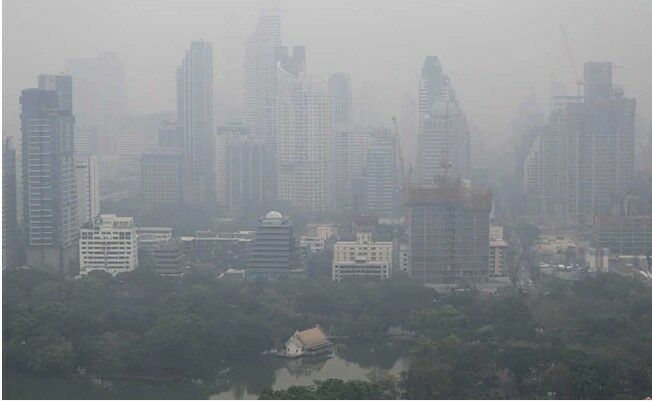Over 10 million Thais suffered illnesses linked to toxic air in 2023

More than 10 million Thai citizens sought medical treatment for illnesses connected to toxic air in 2023, as disclosed by authorities.
The National Economic and Social Development Council (NESDC) disclosed this data amidst a toxic air pollution crisis in Thailand.
The root of this crisis lies in widespread farm burning and forest fires, particularly rampant in the country’s northern regions, which often shroud the nation in a noxious smog at the year’s onset. Unfortunately, the beginning of 2024 has shown no respite, witnessing a surge in toxic air-related disease cases compared to the preceding year.
According to AFP, the number of individuals seeking treatment for air pollution-related illnesses soared from 1.3 million in the first nine weeks of 2023 to a staggering 1.6 million at the onset of 2024. This alarming increase comes into perspective against Thailand’s approximate population of 72 million.
The affected individuals span a spectrum of chronic conditions including lung cancer, bronchitis, asthma, and heart diseases. The NESDC has called for urgent prioritisation of addressing the impact of PM2.5 on public health.
PM2.5, denoting hazardous particles with diameters of 2.5 micrometres or smaller, poses significant health risks as it infiltrates the bloodstream through the lungs. Exposure to these micro-pollutants can cause eye and skin irritation, coupled with respiratory distress such as coughing and chest tightness, particularly exacerbating pre-existing heart or lung conditions.
Cities in northern Thailand have notably gained infamy for their air quality issues, with Chiang Mai, Chiang Rai, and Lampang receiving “unhealthy” ratings from air quality monitoring platform IQAir. The dry season, typically spanning from November to March, aggravates the situation due to seasonal burning by farmers clearing sugarcane and rice fields.
Government solution
In a bid to address the crisis, Prime Minister Srettha Thavisin has pledged to enhance air quality, with legislative support evidenced by the endorsement of a bill aimed at combating pollution. Recent initiatives include plans to deploy 30 aircraft nationwide for cloud seeding to induce rain and alleviate pollution.
In February, amidst escalating pollution levels, Bangkok authorities urged employees to work from home for two days to mitigate health risks. Over the years, citizens and environmental groups have resorted to legal action, demanding government intervention against pollution, reported BBC News.
A landmark case saw around 1,700 individuals in Chiang Mai filing a lawsuit against former Prime Minister Prayut Chan-o-cha and two state agencies for negligence in pollution control, alleging a significant impact on life expectancy. Notably, in January of this year, a Chiang Mai court mandated the government to devise an emergency plan to improve air quality within 90 days.
Latest Thailand News
Follow The Thaiger on Google News:


























